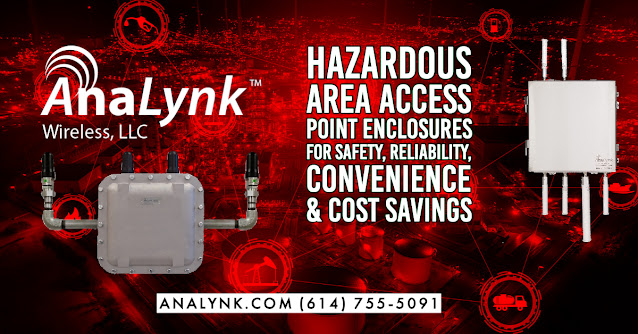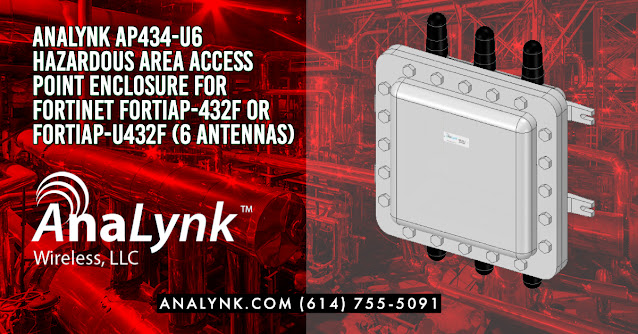Analynk Wireless manufactures hazardous area wireless access point enclosures and hazardous area wireless antennas. Analynk is also a certified UL508A panel manufacturer providing high quality control panels to Ohio and surrounding areas. For more information, visit the Analynk website here or call 614-755-5091.
Celebrating 20 Years Serving Our Customers
Hazardous Area Access Point Enclosures for Safety, Reliability, Convenience and Cost Savings
Industrial wireless networks are a much-needed solution for hazardous areas where wired connections are impossible. Wireless networks are also an ideal choice for temporary or mobile applications.
Industrial Wireless Networking is a newer technology quickly becoming the standard for companies that need to transmit data wirelessly in hazardous areas. Industrial wireless networks are gaining traction in hazardous areas with distinct advantages over hard wiring. However, some disadvantages make it less desirable than hard wiring.
Industrial wireless networks are a cost-effective solution to provide reliable, secure, and fast internet access in hazardous areas. In recent years, the demand for industrial networks increased with the increasing popularity of IoT (Internet of Things). This industrial network segment is seeing a surge in demand as more instruments and supervisory control systems connect their devices to the Internet.
Wireless has been a solution to many challenges faced in industrial networking, from remote locations to temporary installations, with the convenience of mobility and reduced installation costs.
An access point is a device that establishes a wireless local area network, often known as a WLAN. An access point uses Ethernet to connect to a wired router, switch, or hub and broadcasts a WiFi signal to a specific region of a building or plant. However, a significant challenge remains: how to prevent access points from causing ignition and protect the access point against harsh environmental conditions?
Hazardous Access Point Enclosures are enclosures used to protect wireless access points in hazardous areas. They provide safety to the wireless network equipment and the people who work in the area.
Some of the hazards that might be present in a hazardous area include combustible gases, oxygen-rich atmospheres, and flammable dusts. These hazards can cause a fire or explosion if they come into contact with an open flame, spark, or heat source.
To ensure that access point devices can operate reliably in hazardous environments such as oil rigs or chemical plants, they need protection from combustible gases, dust particles, and corrosive chemicals.
The need for Hazardous Access Point Enclosures is increasing daily due to new wireless network technology and are a requirement for all access points operating in hazardous industrial areas. These enclosures protect the access points from dangerous areas and environments. They have various features to ensure the environment is protected and secure for the personnel working in the area.
Some of these features include:
- Compliance with international standards
- Resistance to extreme temperatures
- Permits installation in any location within a hazardous area
- Protection against dust and water ingress
Industrial wireless networks have a lot of benefits over hard wiring. The lack of wires makes installing and moving around in hazardous areas easy. In addition, you can eliminate the cost and hassle of having to replace or repair wires if they break or get cut. Access points are critical components of industrial networks, and Hazardous Area Enclosures are an essential safety measure for access point manufacturers when applying their products in these settings.
Analynk AP628 Dual-Band Hazardous Area Access Point Enclosure for Aruba AP-574
- Class I, Division 1, Groups, C & D
- Pharmaceuticals
- Oil refineries
- Oil & Gas Platforms
- Chemical Plants
Analynk AP434-U6 Dual-Band Hazardous Area Access Point Enclosure for Fortinet FortiAP-432F or FortiAP-U432F (6 Antennas)
Applications:
- Pharmaceuticals
- Oil refineries
- Oil & Gas Platforms
- Chemical Plants
- AP434 –U6
- AP434-U6-N4 (NEMA 4X)
- AP434-U6-ATEX (ATEX Zone 1)






